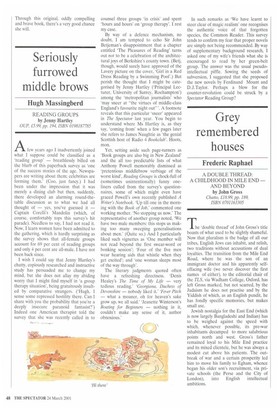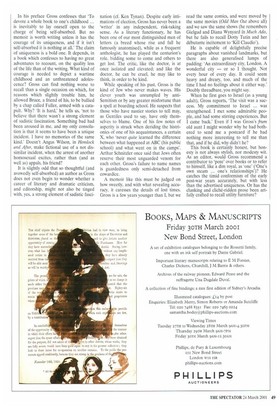Grey remembered houses
Frederic Raphael
A DOUBLE THREAD: A CHILDHOOD IN MILE END — AND BEYOND by John Gross Chatto, £18.99, pp. 189, ISBN 0701163305 he 'double thread' of John Gross's title boasts of what used to be slightly shameful. Now that pluralism is the badge of all our tribes, English Jews can inhabit, and relish, two traditions without accusations of dual loyalties. The transition from the Mile End Road, where he was the son of an immigrant doctor and his apparently selfeffacing wife (we never discover the first names of either), to the editorial chair of the TLS, via Wadham College, Oxford, has left Gross marked, but not scarred, by the Judaism he does not practise and by the Yiddish of which, as an English pundit, he has fondly specific memories, but makes small use.
Jewish nostalgia for the East End (which is now largely Bangladeshi and Indian) has to be weighed against the speed with which, whenever possible, its pre-war inhabitants decamped to more salubrious points north and west. Gross's father remained loyal to his Mile End practice and its mixed clientele, but he was always a modest cut above his patients. The outbreak of war and a certain prosperity led him to move his family to Egham, whence began his older son's recruitment, via private schools (the Perse and the City of London), into English intellectual ambitions.
In his preface Gross confesses that 'To devote a whole book to one's childhood ... is inevitably to lay oneself open to the charge of being self-absorbed. But no memoir is worth writing unless it has the courage of its uniqueness, and if it isn't self-absorbed it is nothing at all.' The claim of uniqueness is a bold one. It depends, in a book which confesses to having no great adventures to recount, on the quality less of the life than of the writing. What kind of courage is needed to depict a wartime childhood and an unthreatened adolescence? Gross can find nothing worse to recall than a single occasion on which, for reasons which slightly trouble him, he allowed Bruce, a friend of his, to be bullied by a chap called Fuller, armed with a catapult. Why? 'It is hard,' he tells us, 'not to believe that there wasn't a strong element of sadistic fascination. Something bad had been aroused in me, and my only consolation is that it seems to have been a unique incident. I have no memories of the same kind.' Doesn't Angus Wilson, in Hemlock and After, make fictional use of a not dissimilar incident, when the arrest of another homosexual excites, rather than (and as well as) appals, his friend?
It is slightly odd that so thoughtful (and avowedly self-absorbed) an author as Gross does not even begin to wonder whether a career of literary and dramatic criticism, and editorship, might not also be tinged with, yes, a strong element of sadistic fasci
nation (cf. Ken Tynan). Despite early intimations of election, Gross has never been a 'writer' in any independent, risk-taking sense. As a literary functionary, he has been one of our most distinguished men of letters (a breed whose rise and fall he famously anatomised). while as a frequent anthologist, he has played the centurion's role, bidding some to come and others to get lost. The critic, like the doctor, is at once isolated and elevated; and like the doctor, he can be cruel, he may like to think, in order to be kind.
While speaking of his past, Gross is the kind of Jew who never makes waves. His clever youth was unrumpled by antiSemitism or by any greater misfortune than a spell at boarding school. He suspects that those who have nastier stories to tell may, as Gentiles used to say, have only themselves to blame. One of his few notes of asperity is struck when deriding the histrionics of one of his acquaintances, a certain X, who 'never quite learned the difference between what happened at ABC (his public school) and what went on in the camps'. Arthur Schnitzler once said that Jews often reserve their most unguarded venom for each other. Gross's failure to name names is guardedness only semi-detached from cowardice.
A memoir like this must be judged on how sweetly, and with what revealing accuracy, it caresses the details of lost times. Gross is a few years younger than I, but we read the same comics, and were moved by the same movies (Odd Man Out above all) and we saw the same shows (he remembers Gielgud and Diana Wynyard in Much Ado, but he fails to recall Dotty Tutin and her debutante incitement to 'Kill Claudio').
He is capable of delightfully precise paragraphs about vanished landmarks, but there are also generalised lumps of padding: `An extraordinary city, London. A wonderful city — or so I thought. Not every hour of every day. It could seem heavy and dreary, too, and much of the time I had no feelings about it either way.' Doubly threadbare, you might say.
When he first goes to Israel (as a young adult), Gross reports, `The visit was a success. My commitment to Israel ... was strengthened. I met some admirable people, and had some stirring experiences. But I came back.' Even if I was Gross's frum old aunt I might wonder why he had bothered to send me a postcard if he had nothing more interesting to tell me than that, and if he did, why didn't he?
This book is certainly honest, but honesty is not always stylish, nor modesty wit. As an editor, would Gross recommend a contributor to 'pore' over books or to refer to himself, like a dim royal, as 'one' ('One's own steam one's relationships')? He catches the timid conformism of the early post-war years accurately, but with less than the advertised uniqueness. Or has the clunking and cliché-ridden prose been artfully crafted to recall utility furniture?















































































 Previous page
Previous page